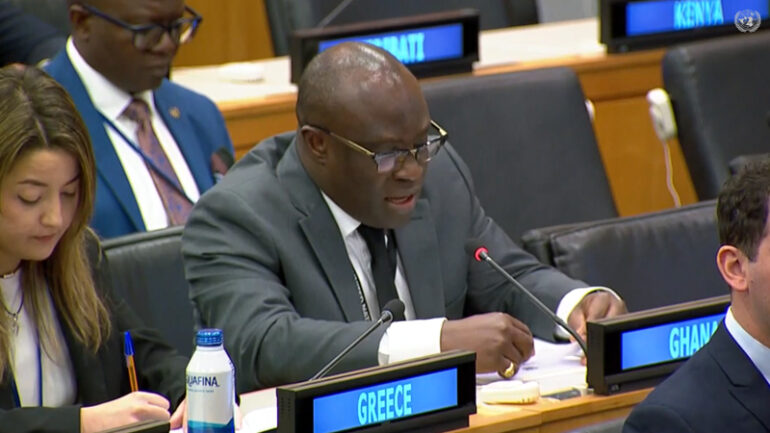Second Committee, 3rd plenary meeting – General Assembly, 77th session

- Posted by admin
- Posted in Statement & Remarks
“TRANSFORMING POLITICAL COMMITMENTS INTO ACTIONS FOR SUSTAINABLE RECOVERY – REBUILDING A SUSTAINABLE FUTURE FOR ALL”
Madam Chair,
Colleagues,
Ghana aligns herself with the statements delivered by the distinguished representatives of Pakistan and Nigeria speaking on behalf of the G 77 and the African Group respectively and wish to make the following statement in my national capacity. Let me begin by thanking the members of the Bureau of the 76th for their leadership of the Committee. I also congratulate you, Ambassador Lachezara Stoeva on your election as the Chair of the Second Committee for the 77th Session and convey to the other members of the Bureau, our warmest felicitation. I assure you of Ghana’s full cooperation as you take on this onerous task in these continuing times of immense global challenges.
As we mark the 35th anniversary of the United Nations Declaration on the Right to Development, the challenges we currently face reminds us of how the global community is failing the global south. It also reflects the broken assumptions on cooperation and the lack of credibility of the structures that support international development. This is why the theme of this general debate is important, in its amplification of the urgent need for a coordinated global action to transform the never-ending cycle of recommitment, not backed by the required resources or political will, into real tangible actions for sustainable recovery and rebuilding a sustainable future for all.
Admittedly, the world does not need dire warnings about the scale and dimension of the present global developmental challenges. We, particularly those in developing countries live it, we see it, and we experience it. There is, therefore, no further need to dwell on them. Neither is it useful to dwell on the solutions to these challenges because there is no shortage of ideas and practical proposals on how to address the challenges. Indeed, during the course of this year and at major conferences such the FFD, HLPF and of course during the High-Level week several Heads of delegation put forth practical proposals on ways out of these crises.
So, the critical question to ask therefore is: why are we not acting, especially if we know the objectives we need to pursue and the goals that are required to achieve effective international development, which is within the reach and capacity of the international development and financial systems? The simple answer, we believe, is the huge deficit in political will on the part of the empowered world and institutions to transform their commitments to concrete actions. Indeed, our close observation of recent global crises has shown the level of international cooperation that the developed world has been prepared to offer and where priorities are prepared to be established.
Therefore, my message today is a simple one. It is time to move from promises to action! It is time for the developed world to stop paying lip service and act swiftly on their commitments to developing countries on climate change, particularly to reduce emissions and the provision of $100 million a year to developing countries. It is time for developed countries to fulfill their unmet ODA commitments to developing countries, in keeping with their previous undertakings, and to scale up those efforts to play a meaningful role in eradicating poverty in all its forms and dimensions, including to achieve the national target of 0.7 per cent of gross national income and 0.15 to 0.20 per cent of ODA/GNI to the least developed countries.
It is time for the developed world to bridge the funding gap of the SDGs which currently stands at $ 4.3 trillion annually. It is time for developed economies to genuinely commit to help stop the illicit financial flows particularly from Africa, which UNCTAD estimates at around USD$88 billion every year. It is time for developed countries to honour their commitments to accelerate the transfer of technology to developing countries on favourable terms, including on concessional and preferential terms. It is also time for developed countries to honour their commitments to promote and uphold a universal, rules-based, open, non-discriminatory and equitable multilateral trading system under the World Trade Organization (WTO).
Madam Chair, Colleagues,
The call to action on the issues I have outlined is not intended to discount the responsibility of developing countries as vanguards of their own development trajectories. Without a doubt, developing countries, particularly those in Africa are conscious of and committed to their own development, as reflected in the adoption of Agenda 2063, which in large measure, and in many parts, has close alignment with the 2030 agenda for sustainable development. However, confronted with a historical legacy of drained financial resources from developing countries particularly in Africa, and aware of the interrelated nature of our dependent world, we believe that a fulfilment of the commitments which align with the common interest is what is urgently required by the peoples of the world who desire to live in prosperity, peace and dignity. It is my fervent hope that discussions that will ensue in this Committee during this session will bring us all closer in transforming commitments into real action for sustainable recovery and a sustainable future for all.
I thank you.
